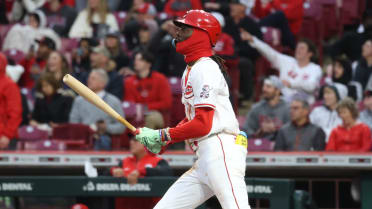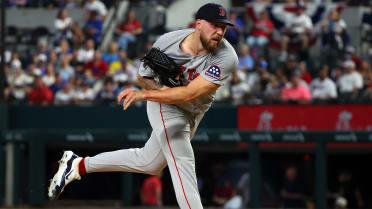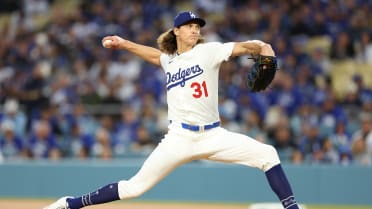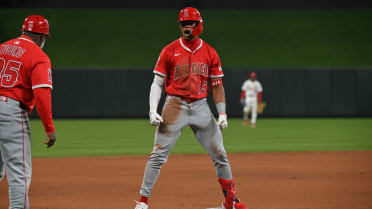The Texas Rangers, maybe more than any team in the league, have a lot to look forward to this offseason. The organization will have some roster crunching to do in the coming months with a few moves already made. Starting pitcher Mike Foltynewicz, relief pitcher Hunter Wood and outfielder Jason Martin all elected free agency after clearing waivers on Oct. 9, while starting pitcher Kohei Arihara was designated for assignment before the season's end.
With the seven players on the 60-day injured list set to return to the 40-man roster after the World Series, the Rangers have a lot of decisions to make between now and then. General manager Chris Young didn’t mince words when saying the club could look to improve at every position this winter. Here’s a look at Texas’ major contributors in 2021 and how they may fit into the future of the organization:
C Jose Trevino (arbitration eligible after 2022): Trevino was the Opening Day catcher and shared the duties behind the plate with Jonah Heim. Both catchers were phenomenal defensively, but Trevino had the slight edge at the plate. In his first full season against Major League pitching, the 28-year-old hit .239 over 89 games.
C Jonah Heim (arbitration eligible after 2023): Though Khris Davis was the big name in last season's trade with the A’s for Elvis Andrus, Heim was the more productive acquisition for the front office. Like Trevino, Heim was a defense-first catcher who hit just .196 through 82 games in his first full big league season. Both catchers are likely to return for ‘22, but things could get dicey when Sam Huff -- Texas’ No. 5 prospect per MLB Pipeline, who briefly debuted in 2020 -- returns to the big league stage.
1B Nathaniel Lowe (arbitration eligible after 2023): Another trade acquisition from last winter, Lowe was notably up-and-down in his first full Major League season, but finished the year with a .264/.357/.415 slash line and a career-high 18 home runs. Though his defense could use some additional work, Lowe is one of only a few Rangers who will come into Spring Training with the upper hand as the front office looks to improve across the diamond.
2B Nick Solak (arbitration eligible after 2022): Solak was the Rangers’ Opening Day second baseman, but slightly regressed at the plate and was optioned for the first time since becoming a regular starter. He’s only 26 and there’s still upside, but he could be on the trade block or a roster crunch casualty if it comes down to it. He’s most likely a utility player -- he’s played both infield and outfield at the big league level -- if he remains with the Rangers in 2022.
INF Andy Ibáñez (arbitration eligible after 2024): Nobody made more of a case for himself in the second half than Ibáñez. The infielder was called up in early May, but didn’t contribute much before being optioned back to Triple-A Round Rock. Then, Ibáñez was recalled after the Trade Deadline and went on to hit .321/.362/.514 from August onward. Ibáñez may not return in a starting role, but with a solid bat and the ability to play any of the four infield positions, there’s no doubt that there's a spot for him on the 2022 Rangers.
INF Yonny Hernandez (pre-arbitration): Hernandez, like Ibáñez, is a versatile infielder with speed who can play around the infield. Unlike Ibáñez, though, his bat wasn’t quite up to standard in his 43 big league games this season. He hit just .217 after making his debut on Aug. 8 and will likely stay on the 40-man, but get some time in Triple-A to start 2022.
SS Isiah Kiner-Falefa (second-year arbitration eligible): In his first full season at shortstop, Kiner-Falefa was one of the most consistent Rangers, save for a slight dip in offensive production in July. He finished the season hitting .271 with a career-high eight home runs, and while he likely won’t win back-to-back Gold Gloves, he was more than serviceable at the position (11 Defensive Runs Saved). Kiner-Falefa will almost definitely be part of the 2022 Rangers, but it’s yet to be seen if he will be at shortstop or elsewhere on the diamond.
3B Brock Holt, Charlie Culberson (free agents after World Series): The two infielders were solid in the field, but better served the Rangers with their clubhouse presence as veterans on a mostly inexperienced big league club. One could remain for 2022 in a utility role, but it wouldn't be shocking to see both sign with a contender next season.
LF DJ Peters (pre-arbitration): Peters was a surprising addition following the Trade Deadline, being claimed by the Rangers after he was designated for assignment by the Dodgers. He ultimately played as a de-facto Joey Gallo replacement, striking out a lot, homering a lot and flashing jaw-dropping defense. He finished with a sub-.200 batting average, but hit 12 of his 13 home runs in a Rangers uniform over the last two months of the season. Peters will no doubt come into 2022 with a chance to win a job at one of the three outfield positions.
CF Leody Taveras (arbitration eligible after 2023): Taveras entered 2021 as the Rangers' No. 4 prospect, per MLB Pipeline, but was optioned before April was even over. He was recalled on Aug. 24 and hit .221 in September. The Rangers aren’t ready to give up on their former big-name prospect, but he has a lot of work to do to earn a spot out of Spring Training.
CF Eli White (arbitration eligible after 2023): White has often been referred to as one of the most athletic players in the Rangers' organization and he’s shown it at multiple points in his career. Just when it seemed like White was going to break out, he suffered a right elbow strain that required surgery in September. White, who finished the season with a .177 average and six home runs, is likely in the same situation as Taveras of needing to earn a spot heading into Spring Training. White, 27, is much older than Taveras, 23, so the Rangers might not be willing to use a 40-man spot trying to develop a late bloomer.
RF Adolis García (arbitration eligible after 2026): The American League Rookie of the Year candidate was by far the Rangers' best player down the stretch and even carried the team at points during the season. Manager Chris Woodward has said that the outfielder deserves all the praise and consideration going into 2022, as he is likely the only player with a confirmed spot going into Spring Training.
DH/OF Willie Calhoun (first-year arbitration eligible): Calhoun may be one of the biggest question marks going into 2022 at no fault of his own. His injury struggles have prevented him from reaching his full potential, and after hitting .250/.310/.381 over 75 games this season, the Rangers could be looking to move on from a once-promising prospect.
DH/1B Ronald Guzmán (first-year arbitration eligible): Guzmán is in a similar position as Calhoun in that his injury, a right meniscus tear that required season-ending surgery in April, prevented the Rangers from properly evaluating him before he heads to arbitration this winter. With Nathaniel Lowe likely holding onto the starting first-base position, Guzmán may end up getting cut if his bat isn’t up to DH standard.
Starting pitchers
RHP Jordan Lyles (free agent after World Series): Lyles was the only remaining veteran on the pitching staff after Texas shipped Kyle Gibson and Ian Kennedy to the Phillies at the Trade Deadline. He handled the responsibility admirably and even admitted that he was out of his comfort zone in a mentorship role. His performance leaves a lot to be desired (10-13 record with a 5.15 ERA), but the veteran presence cannot be overlooked when evaluating whether he’ll return to Arlington in 2022.
LHP Taylor Hearn (Super Two eligible): Hearn may have been the pitching staff's biggest 'W' this season; Woodward said Hearn was one of the team's brightest spots in the second half. The southpaw started the season as a bullpen arm and eventually transitioned to a starter after the Trade Deadline. His final ERA of 4.66 doesn’t tell the full story of how truly solid he was down the stretch. There’s no doubt he’ll open 2022 as part of the Rangers’ rotation.
RHP Dane Dunning (arbitration eligible after 2023): Dunning’s season went about as expected. Following Tommy John surgery in 2019 and the shortened season in ‘20, the Rangers were going to limit his innings and wanted to see development outside of the statistics. He posted a 4.51 ERA and will no doubt return to the rotation with likely no restrictions in 2022.
LHP Kolby Allard (arbitration eligible after 2022): Like Hearn, Allard started the season as a bullpen arm and eventually transitioned to the rotation. Unlike Hearn, he transitioned back to the bullpen toward the end of the season. Allard struggled down the stretch and finished with a 5.41 ERA, but he isn’t in danger of being a victim of a roster crunch. It would be shocking if he returned to the rotation, but he’s a solid bullpen arm and the Rangers will likely still need bulk innings in 2022.
RHP Spencer Howard (pre-arbitration): Howard was the main return in the aforementioned Trade Deadline deal that sent Gibson and Kennedy to the Phillies. He’s been a work in progress this season, but the Rangers will no doubt keep him around in hopes of developing him into the top prospect he was once considered in Philadelphia’s organization.
RHPs A.J. Alexy, Glenn Otto (arbitration eligible after 2023): The two Top 30 prospects made their debuts in late August, with Otto notching six starts and Alexy making four starts and one relief appearance. Both were acquired in big-time trades: Otto came in the Gallo deal at this year’s deadline and Alexy arrived in the Yu Darvish trade back in 2017. They’ll both remain in the organization and will have to earn a spot in the 2022 rotation.
Relief pitchers
LHP Brett Martin (first-year arbitration eligible): Martin was one of the more underrated relievers for the Rangers this season, posting a 3.18 ERA over 62 1/3 innings in the best full season of his career. He’ll likely continue to be used in the same manner in 2022.
RHP Josh Sborz (arbitration eligible after 2023): Sborz was often used as a multi-inning arm out of the bullpen this season, posting a 3.97 ERA over 59 innings. He fits in with the 2022 Rangers, especially if the pitching staff continues to need pitchers to eat innings.
LHP John King (arbitration eligible after 2023): After starting the season in the bullpen, the Rangers' staff was looking at slotting King into the rotation after the All-Star break. A left shoulder injury and continued setbacks prevented him from being used in that role this season. It’s unclear if the Rangers will try to build him back up to being a starter, but his name being floated in the Gallo deal shows that they’re not unwilling to trade King if necessary.
RHP Demarcus Evans (pre-arbitration): Evans started this season as a Top 30 prospect, but graduated from prospect status early in the season. He struggled at the big league level, posting a 5.13 ERA and spending more time at Triple-A Round Rock than in Arlington. He has a long way to go in order to stick with the MLB roster, but he’s young and won’t likely be on the chopping block.
RHP Drew Anderson (pre-arbitration): Anderson was called up on July 30 to fill some post-Trade Deadline holes. He threw 22 innings for the Rangers, allowing just eight earned runs (3.27 ERA). This season was the first time Anderson had an extended stay at the Major League level and he could remain a bullpen option in 2022.
RHP Jharel Cotton (first-year arbitration eligible): Cotton was a surprisingly solid addition to the Rangers' bullpen after the Trade Deadline, allowing 12 earned runs in 30 2/3 innings (3.52 ERA). Cotton was much-improved from his last MLB appearance in 2017 and raised his stock within the organization. Like Anderson, Cotton could remain with the Rangers, but he may end up the victim of a roster crunch.
RHP Dennis Santana (arbitration eligible after 2022): Santana is one of multiple former Dodgers on the Rangers' roster, having joined Texas in early July. He posted a 3.63 ERA over 39 2/3 innings with Texas, increasing his strikeouts and slashing his walks upon leaving Los Angeles. Santana steadily improved as the season went on and could return in a similar role.
RHP Joe Barlow (pre-arbitration): The rookie took over closer duties after the Trade Deadline when Ian Kennedy was shipped off to the Phillies for Spencer Howard. He handled it better than anybody could have expected, notching 11 saves in 12 opportunities. It’s unclear if he’ll continue to work as a closer with Jonathan Hernández and José Leclerc set to return from the injured list next season, but Barlow no doubt has a promising future with the Rangers.
RHP Spencer Patton (pre-arbitration): Patton got a crack at closing duties after the Trade Deadline, but mainly worked as the setup man after blowing three saves in five tries. He was serviceable, though, posting a 3.83 ERA. His future with the Rangers may be in question with the return of Hernández and Leclerc in ‘22.
Kennedi Landry covers the Rangers for MLB.com.




